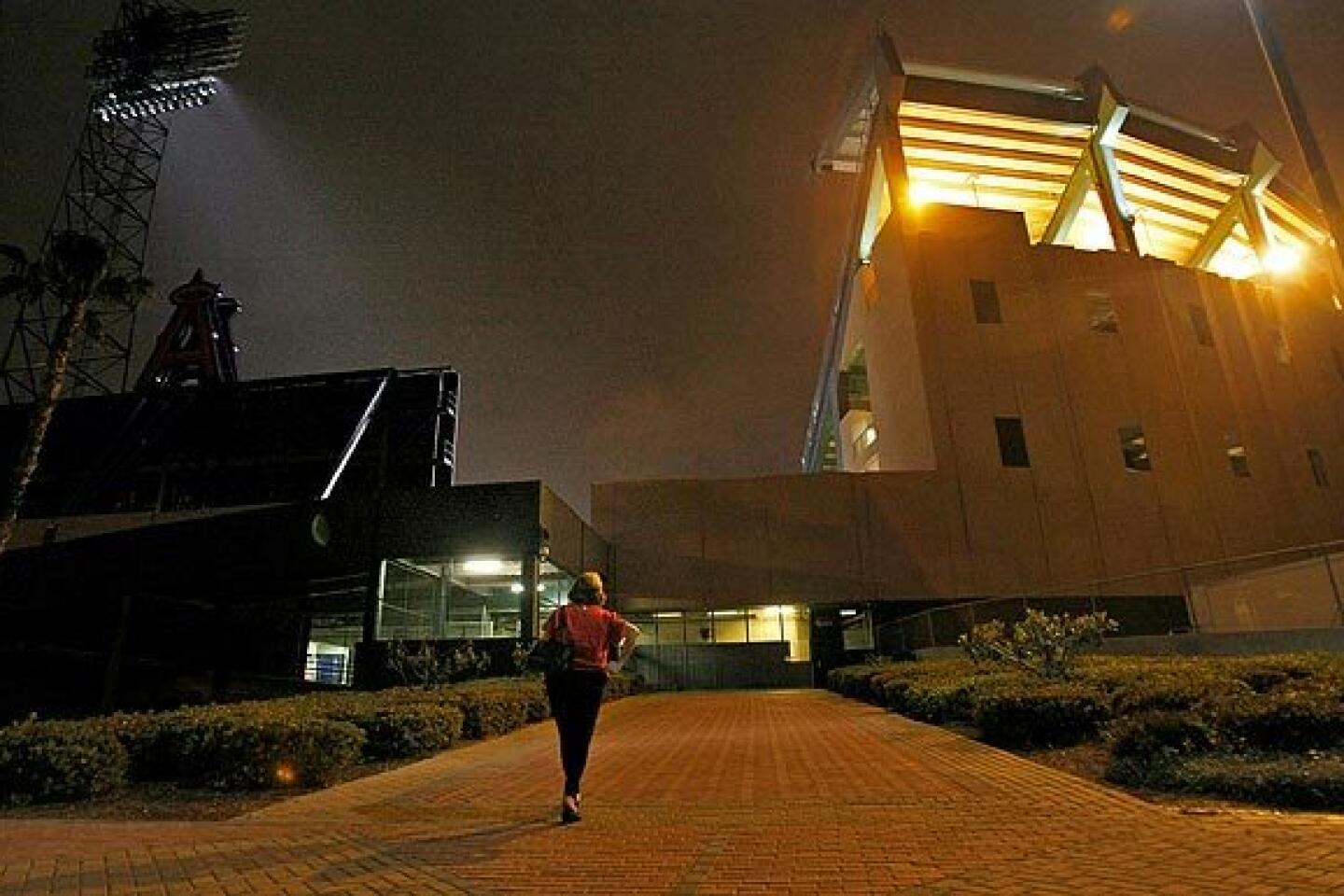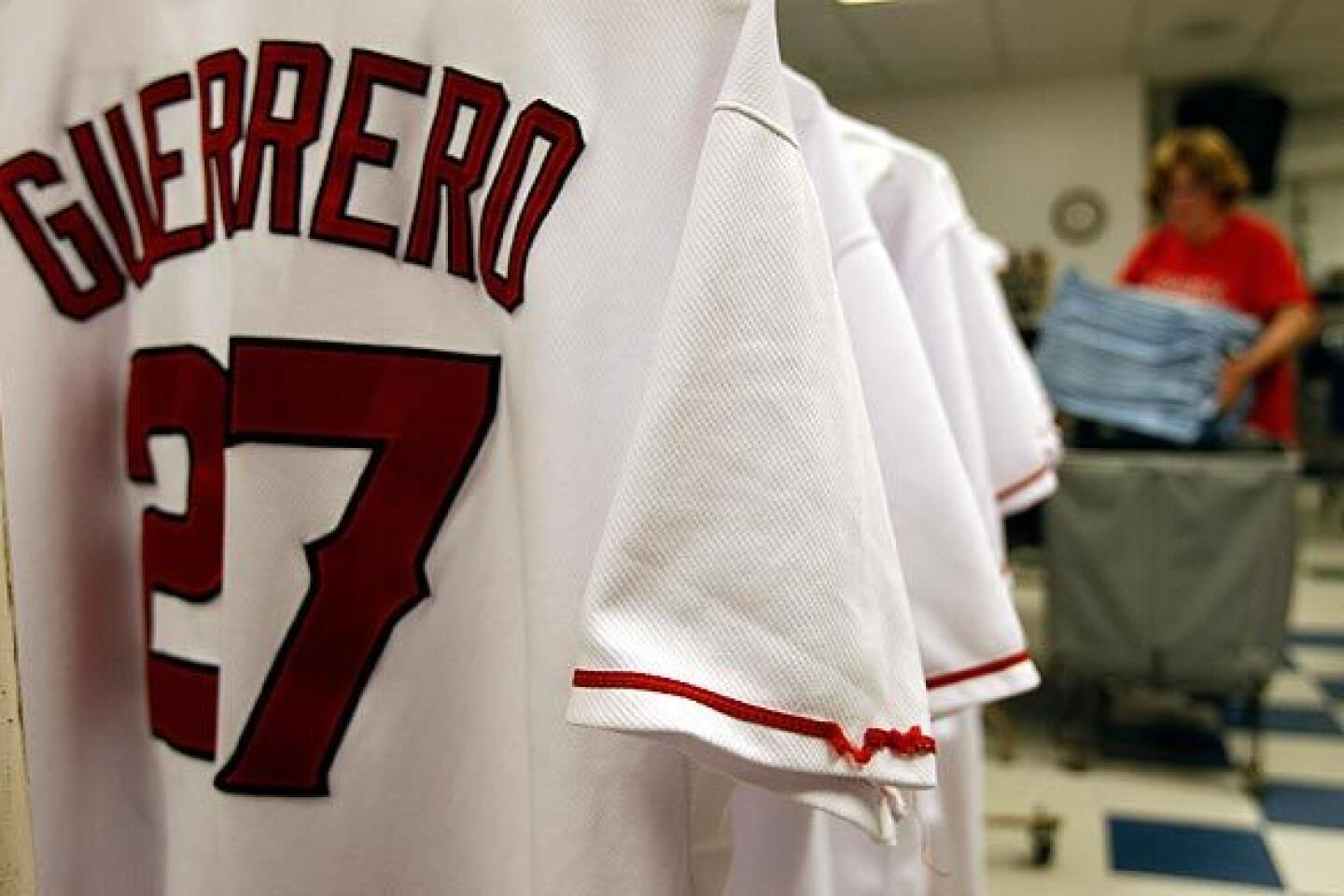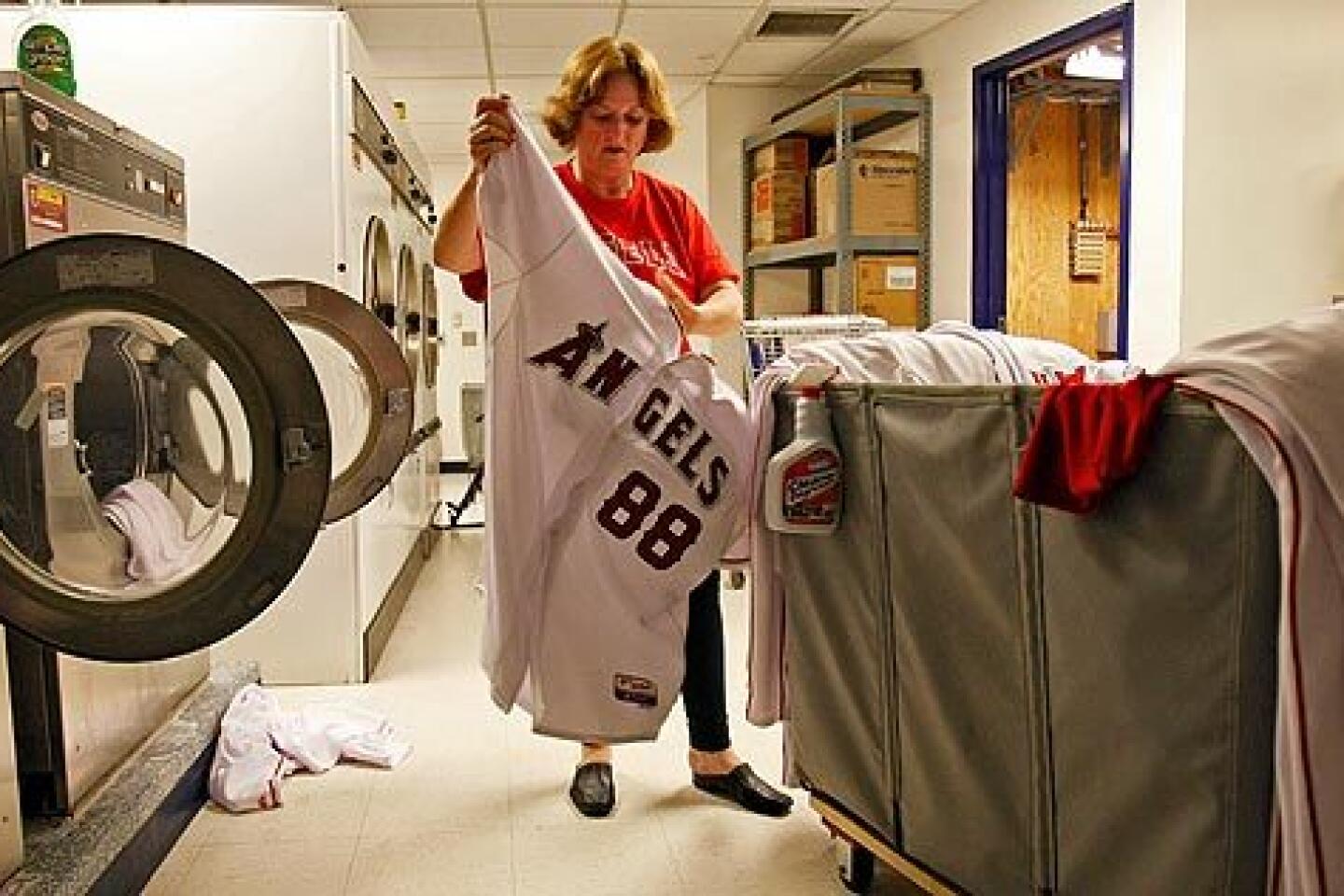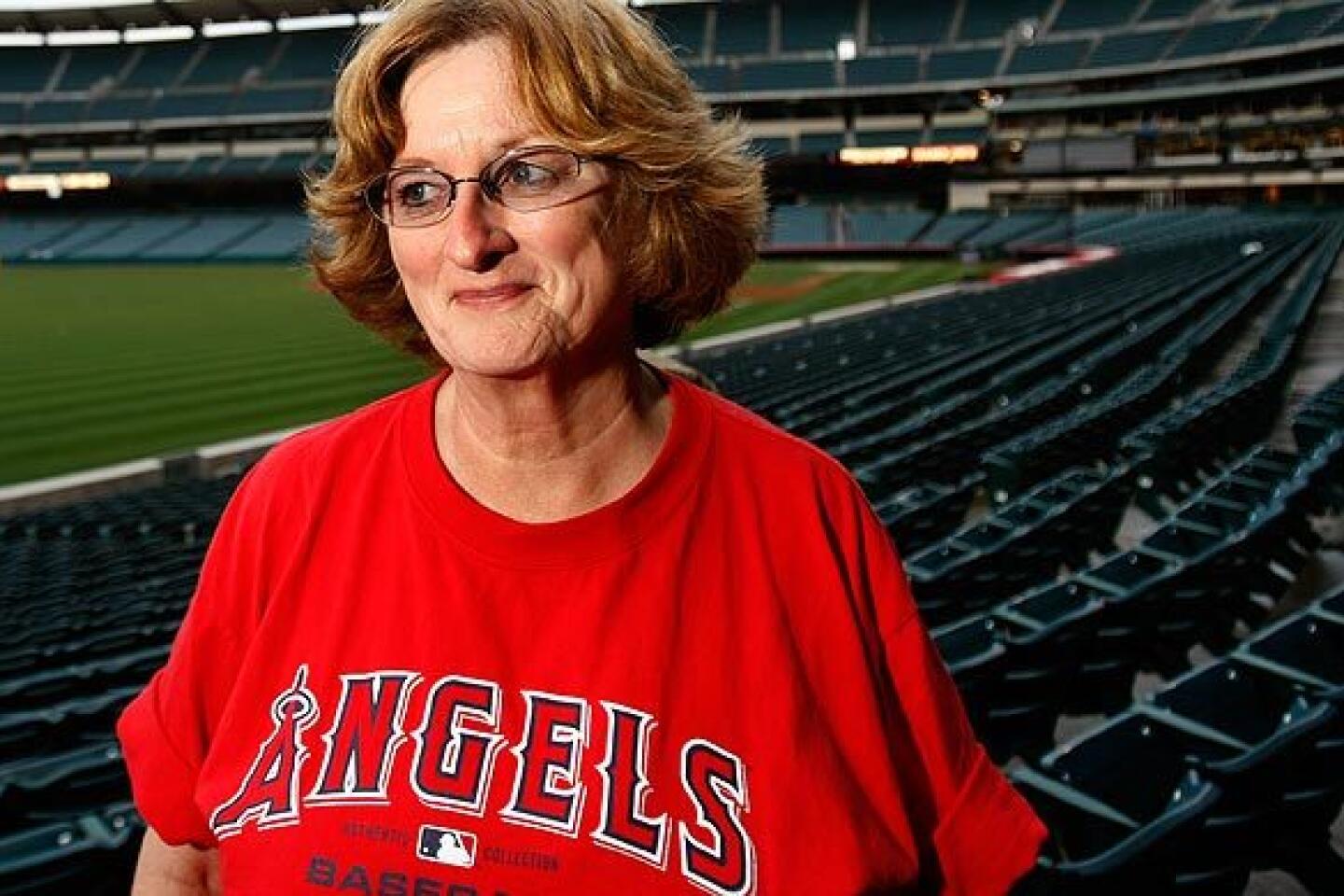She knows all the dirt on the Angels
- Share via
It’s just past 3 a.m. on a chilly Wednesday morning when Erica Ford pulls her tidy 4-year-old SUV into a parking space behind the left-field wall at Angel Stadium.
A few hours earlier the stadium held more than 35,000 screaming fans. Now, but for a dozen workers hosing down the grandstands, it’s quiet and empty as Ford makes her way deep inside the ballpark, a ritual repeated before dawn on the day after every Angels home game.
Welcome to the glamourless backstage of professional baseball, a sport that’s watched by millions and played by millionaires. Hours after they clear out, Ford steps into a cramped, windowless storeroom off the Angels clubhouse to do laundry for the home team and needlework for both sides.
“She’s kind of like an unsung hero,” said Jeff Davenport, equipment manager for the Kansas City Royals, who like every team visiting Anaheim makes use of Ford’s talents. “Because you’ve got to have that uniform.”
Though Ford has been with the Angels longer than any player except outfielder Garret Anderson, few in the organization know her full name. Or much about what she does.
But after washing their dirty clothes for 11 years, she has learned plenty about them.
Outfielder Vladimir Guerrero, for example, destroys several jerseys each summer by nervously picking apart the piping on the bottom of his sleeves, a habit he’s apparently teaching to infielder Maicer Izturis. Chone Figgins, Brandon Wood and Juan Rivera are not above sacrificing their bodies to make a play, evidenced by their dirt-caked uniforms.
And Manager Mike Scioscia is a superstitious sort whose game pants generally let Ford know the outcome from the most recent game.
“If they’ve won a couple of games in a row, his pants are inside out to keep the luck in,” Ford said.
When the situation calls for it, she can make up a new jersey almost from scratch, as she did several times last month when the Angels promoted rookies from the minor leagues.
With those kinds of roster changes routine, virtually every professional team keeps someone like Ford either on the payroll or on 24-hour call for short-order stitchery.
“Good tailors, good repair people are worth their weight in gold,” said Zack Minasian, longtime equipment manager for the Texas Rangers. “You have a good one, they take a lot of pressure off you. If you have a bad one, then it’s tough.”
Judging by appearances, Ford is among the best.
The Rangers have thought enough of her to hold off on uniform alterations until they arrived in Anaheim. The Yankees once picked her to sew special commemorative patches on their shirts, and another time the Seattle Mariners, mired in a losing streak, asked Ford to change their luck by changing the look of their jerseys. Overnight.
“She’s just really good at what she does,” said Ken Higdon, who has run the Angels clubhouse since 1994.
Still, the job is just a moonlighting gig for Ford, 59, a small, tireless woman with rust-colored hair who spends days working with severely handicapped children at Anaheim’s Betsy Ross School, an elementary school named for the country’s most famous seamstress.
Ford, who made her husband’s business suits and her four daughters’ school clothes from scratch, landed her sewing job on the recommendation of friends who knew of her talent with a needle and thread.
“It was just one of those things,” said Ford, who crochets, knits, quilts and paints in addition to sewing. “It was less than full time, and I thought it might be fun.”
From her first early morning, when she put a new uniform together in a fraction of the time it took the team’s old seamstress, it was clear she was a natural. That was 1997, when the team belonged to Disney, which also owned the NHL’s then-Mighty Ducks. So Ford, who grew up a hockey fan in Detroit, agreed to do the Ducks’ laundry too.
It was a short-lived experiment.
“I don’t like hockey because it’s very hard to get the stick marks out of the shirts. And all of their socks have to be mended by hand,” she said.
But that’s not the worst of it.
“They smell worse,” Ford said, referring to the uniforms. “Hockey’s awful.”
Yet hockey remains her passion.
Ford says she’ll also watch baseball as a fan, but her professional obligations can temper her rooting interest: “I’ll sit there and yell, ‘Don’t slide!’ ”
The players don’t listen, of course, which is why she finds a shopping cart and two huge laundry carts piled to overflowing with soiled uniforms when she unlocks the door to the chilly storeroom that is her office. Once the washers and dryers start running, the temperature soars to more than 90 degrees.
But this year especially, she said, there is something worse than the sauna-like heat: the stains. That’s because the Angels changed the composition of their infield soil, which now includes a stubborn wax dye.
So Ford scrubs the uniforms, treats them with an oil eater she buys in bulk from Costco, then tosses them into one of three large commercial washing machines.
“I haven’t had to scrub shirts for probably four years,” she said. “But the new dirt, it won’t come out.”
Cases of Spray ‘n’ Wash and Bounce dryer sheets are stacked across from three even larger industrial dryers, but that stockpile can disappear quickly. Ford will launder about 60 pairs of pants and about 40 jerseys and wash and fold more than 250 towels each shift.
“My husband folds the towels at home,” she says with a sigh, her face dripping sweat, as shedrops another pile of clean, dark blue cotton towels into a cart. “I’ll do the laundry, but I won’t fold towels.”
This proves to be a relatively easy morning for Ford. The Angels won the night before -- Scioscia’s pants, the first she came to, were inside out -- in a quick game that spared the bullpen, saving Ford extra work. Aside from changing a number on the gray jersey of Oakland Athletics coach Tony DeFrancesco, there’s little to be done by hand.
That’s a marked contrast to a typical morning last season, when Ford was regularly stitching up holes in pants and spending countless hours trying to scrub the pine tar from shortstop Orlando Cabrera’s jersey.
Which is why Ford silently approved of the winter trade that sent Cabrera to the White Sox in exchange for a pitcher, Jon Garland. All pitchers are clean, Ford said.
“I wasn’t happy to see him traded because I felt he was an outstanding player,” Ford said of Cabrera. “But in my line of work, he was very difficult.”
Ford won’t miss pine tar when she leaves her job. Her husband, Bill, who last worked as general manager for a gate manufacturer, has been out of work for three years, and with one daughter getting married in September and another graduating from college before next season, there’s little keeping the Fords in their emptying Anaheim home past this fall.
“This very well could be my last season,” she said.
The $10.70-an-hour wage isn’t keeping her there.
In a regular four-hour shift, Ford pockets about half what each player gets for daily meal money on the road.
“And when you do things for them, you’d think, well, geez, maybe at the end of the year, at World Series time, they’d give you a quarter of a share or something,” Ford said, alluding to the playoff money the teams divide each fall. “But no.”
When the Angels won the World Series in 2002, Ford wound up with a championship ring -- too large and heavy to wear -- but no money.
“There are the perks, though,” said Ford, who has brought her grandchildren into the clubhouse and once got autographs from Derek Jeter and Cal Ripken Jr., among others.
And with one grandson’s favorite team in town last month, she’s been snapping photos of Oakland A’s jerseys on her cellphone and sending them to him.
The grandchildren, who live in Susanville, Calif., benefited from Ford’s Angels connection in another way too. When their school held a fundraiser a few years back, the team donated an autographed World Series ball that helped raise so much money the school was able to fix its track, install drinking fountains and buy benches for the football field.
“The baseball brought all that,” she said. “These guys help me out a lot.”
More to Read
Go beyond the scoreboard
Get the latest on L.A.'s teams in the daily Sports Report newsletter.
You may occasionally receive promotional content from the Los Angeles Times.
















